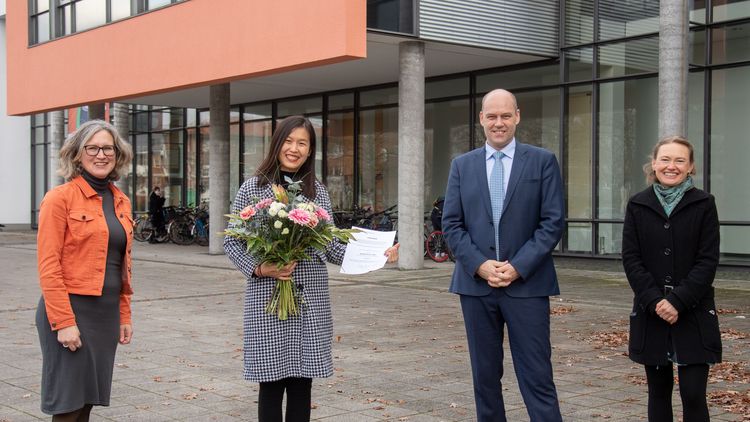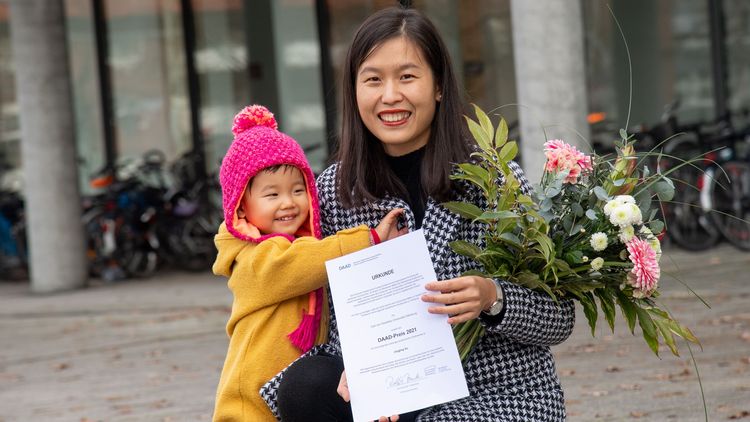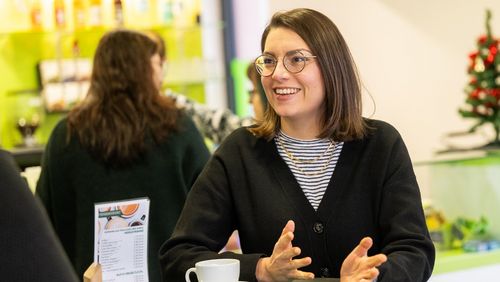Originally, Jingjing Xu planned to spend just one year at the University of Oldenburg. That was in 2017. She stayed longer to continue her research and has now been awarded the DAAD Prize for outstanding achievements of international students for her work.
Jingjing Xu was conducting an experiment in the lab on 17 August 2017 when she observed that the protein she had just extracted from cell cultures had a yellow tinge. In that moment she knew she would be staying in Oldenburg considerably longer than originally planned. "The world around me was the same as before, but everything had changed inside me," says Xu Jingjing, looking back. For her research, including that first breakthrough in 2017, the 30-year-old biologist from China has now been awarded the German Academic Exchange Service (DAAD) Prize for outstanding achievements of international students at German universities, which is endowed with 1,000 euros prize money.
The yellow tinge of the sample, which was to have a considerable impact on Xu's immediate future, was confirmation for the young scientist that her work of the past few months had been successful. Within just a few months, the doctoral student had accomplished what other scientists had been striving for more than a decade: she had produced the protein cryptochrome 4 using bacterial cell cultures. For researchers investigating the question of how migratory birds navigate halfway around the world, this breakthrough was a minor sensation. After all, scientists suspect that this protein, which is found in the retina of birds, is the long-sought magnetic sensor that reacts to the Earth's magnetic field and thus guides the birds to their destination. The production of large amounts of this protein paves the way for further research in this field.
A predilection for solving mysteries
"The phenomenon of bird migration is a mystery," says Jingjing Xu. "How birds know where to go to reach their destination is difficult for us humans to understand. After all, we need Google Maps for that," she notes, grinning. This element of mystery was one of the things that first attracted her to this field of research when she was still a biology undergraduate.
After completing her Master's degree, and with a scholarship from the Chinese Academy of Sciences in her pocket, she applied to come to Oldenburg as a visiting scientist in Professor Henrik Mouritsen's Neurosensory Science / Animal Navigation research group. "I like the interdisciplinarity. Behavioral scientists, molecular biologists, neurobiologists and neuroanatomists all work together here." That's what made the research group at the University of Oldenburg her top choice, she says.
Prepared to do research in Germany, not live here
But before coming to Germany, Jingjing Xu spent weeks learning about protein production and purification with Professor Can Xie in Beijing — right up to the last day before her departure — because she knew how important these techniques are in magnetic sensing research.
This left her with little time to mentally prepare for her new life in Germany. So when she first arrived in Oldenburg in January 2017, she felt somewhat overwhelmed. And on top of that, it was a time of the year that Xu still finds very unpleasant. In the meantime she has grown used to the cold, but not to the darkness of the German winter, she says.
Support from her family in China
Oldenburg and Jingjing Xu — despite the unpropitious beginning this has proven to be a winning combination. After just a few months, Mouritsen offered her a doctoral position in his team. For the young woman, this meant that instead of just one year she would be abroad for three to four years. "My parents are not academics," the biologist explains. Nevertheless, they support their daughter's scientific ambitions. "My mother and grandmother in particular have their own unique, unacademic form of wisdom." And one of their key beliefs is that everyone has to learn to live independently at some point — even if it means years of separation from the family.
From 8,000 kilometers away, in the city of Zaozhuang on China's east coast, Jingjing Xu's mother helps her daughter in her own special way: she teaches her how to cook Chinese dishes and prepare Chinese bread via video chat. And asks that typical mother's question: "Are you dressed warmly enough?
A husband and child in Germany
When Xu found out she would not be returning to China after a year as expected, she had to give the news not only to her family, but also to her boyfriend Junxiao Qin. So he decided to come to her instead. He arrived in Oldenburg in the summer of 2018 and got a job as a programmer for data management in the university. A year later, the couple married at the Consulate General of the People's Republic of China in Hamburg.
A few days before the DAAD award ceremony, Jingjing Xu is in her office on the Wechloy campus, a little backpack belonging to her 20-month-old daughter sitting on her desk. Her husband forgot to take it with him when he brought his wife to work that morning and then hurried off to bring their child to daycare. Since they became parents, she works in the morning and he works in the afternoon. They live together in an apartment near the university campus. Jingjing Xu now also has a German driving licence, which she says has made it easier for her to integrate in Germany.
Settling down in Oldenburg
In addition to professional achievements, the 30-year-old has already accumulated many precious memories during her time in Germany. Research colleagues have become good friends and she even found her favorite place in the city – the Oldenburg harbor area – which altogether makes the city her second home.
But despite all this she sometimes still finds living so far away from her family in China hard. The last time she visited her home country was in 2018. She had planned to travel to China again at the end of 2019, but then the Covid-19 pandemic broke out there and the trip was cancelled. Her parents only know their granddaughter from the computer screen. But at least the current situation has one advantage right now: the DAAD award ceremony is taking place online, so Jingjing Xu's family in China can watch it on livestream.
Her doctoral supervisor, Henrik Mouritsen, nominated her for the DAAD prize. He makes no secret of how highly he thinks of the young researcher. When he proposed her for the award, he described her as one of the most talented scientists he had ever had in his lab. The article based on her work on cryptochrome 4 is compelling evidence of this. She is the lead author of a study with more than 30 co-authors, which even made it onto the cover of the prestigious scientific journal Nature in the summer of 2021.
By awarding Jingjing Xu its prize, the DAAD is also honouring the scientist's social commitment. Dr. Beate Grünberg, scientific coordinator of the German Research Foundation Research Training Group "Molecular Basis of Sensory Biology," stresses that Jingjing Xu plays a key role in promoting the integration of international doctoral students and researchers within the research group. Among other things, she has developed an internal buddy system aimed at helping incoming doctoral students to settle in at the university, and she also advises parents who come from abroad on how to apply for parental leave and child benefits in Germany.





